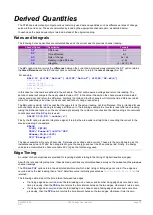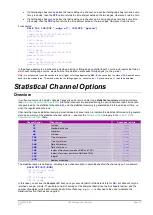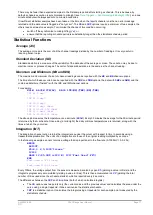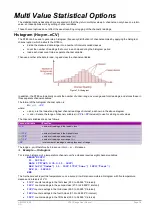
UM-0085-B09
DT80 Range User Manual
Page 63
RG
Job Commands
A number of commands are provided for managing jobs on the DT80.
Listing Job Names
The
DIRJOBS
command lists the names of all jobs stored in the DT80 internal file system, e.g.
DT80>
DIRJOBS
FRED
*GEORGE
+ RON
+ GINNY
UNTITLED
An asterisk (
*
) indicates the currently active job, if any. Locked jobs are indicated by a plus sign (
+
).
The
CURJOB
command simply displays the name of the current active job, e.g.
DT80>
CURJOB
GEORGE
Specifying Jobs
The following commands act on a specific job or jobs. To specify the job you can enter a
jobspec
parameter after the
command, where
jobspec
can be either:
•
a job name in double quotes, e.g.
"FRED"
, or
•
an asterisk (
*
), which will apply the command to all stored jobs, or
•
nothing, in which case the command will operate on the current active job (an error message will be reported if
there is no currently active job).
Showing Program Text
To show the commands which define a job, use
SHOWPROG
jobspec
, e.g.
DT80>
SHOWPROG"RON"
Job Program – RON
BEGIN"RON"
RA1S 3TT 1DS
END
Locking Jobs
If a job is locked then its program text cannot be deleted or overwritten. To lock a job use the
LOCKJOB
jobspec
command; to unlock use
UNLOCKJOB
jobspec
, e.g.:
DT80>
LOCKJOB*
Locking Job FRED – Done
Locking Job GEORGE – Done
Locking Job RON – already locked
Locking Job GINNY – already locked
Locking Job UNTITLED – Done
Deleting Jobs
The
DELJOB
jobspec
command can be used to delete a job from the DT80's internal file system.
However, this command will fail and the job will not be deleted if any of he following apply:
•
the job is the current active job and the
/F
(fix schedules) switch is set (use
/f
to turn this switch off)
•
the job is locked (use
UNLOCKJOB
to unlock it)
•
the job has logged data and/or alarms (use
DELD
to delete them)
Managing a Job's Logged Data and Alarms
The following commands allow you to manage the data and alarms logged by a job:
•
LISTD
lists details of the number of logged records and the associated time range
•
COPYD
is used to unload data and/or alarms – that is: read data from one or more store files, transform it to the
selected format (e.g. CSV), and output it to the currently active comms port, or a file, or an FTP server
•
DELD
will delete a job's logged data and/or alarms respectively.
For more details on these commands, see
Logging and Retrieving Data (P94)
.
















































